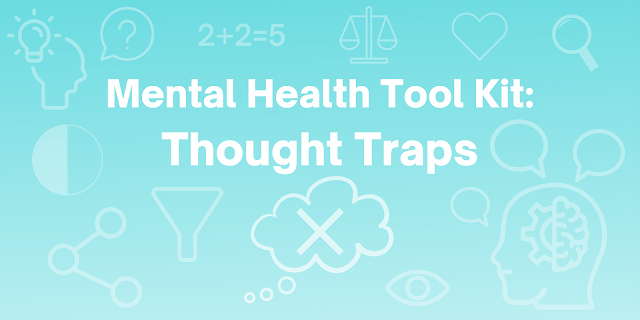What are thought traps?
Thought traps are unhelpful ways of thinking, also known by many other names such as "cognitive distortions" or "thinking styles." Taking time to really understand thought traps and making the active effort to change them can be an essential step towards mental wellness.
Here is a great video from Anxiety Canada about thought traps:
Below is a graphic from PsychologyTools.Org, describing some thought traps:
Googling "thought traps" or "cognitive distortions," reveals many useful explanations and images for reference. However, note that some sources confuse thought traps relating to mental health with those of scientific, critical thinking (such as the "Dunning-Kruger Effect," "in-group bias," or "availability heuristic"). Of course, both types of thinking errors are important to recognize, but for the purposes of improving mental health, scientific thinking errors are of lower priority.
Summary of Thought Traps
- Black & White Thinking
- Thinking of things on either end of the extreme.
- Example: "You either hate me or love me."
- Catastrophizing
- Escalating the seriousness of an issue to the extreme, assuming the worst.
- Example: "Losing my partner means the end of my world."
- Emotional Reasoning
- Directly associating emotions with fact.
- Example: "I am experiencing anger, which means I have to punish someone."
- Fortune Telling
- Predicting the future.
- Example: "This year is going to be horrible."
- Labeling
- Defining a person or situation by one feature, ignoring the complexities in favour of rigid, oversimplification.
- Example: "I am a depressed person."
- Magnification & Minimization
- Making something out to be a worse issue or simpler issue than it really is.
- Example: "My impaired driving isn't so bad - everyone does it!" or "The first day on the job and I stumble over my words! I have to quit now!"
- Filtering
- Filtering out only one aspect of a situation. This might include filtering out only the negative or positive feature of something, or other aspects.
- Example: "It doesn't matter that I had fun at my birthday party - I didn't get a gift from my friend and my mom showed up late! It was awful."
- Mind Reading
- Assuming to know the thoughts or emotions of other people.
- Example: "I know I've never talked to her, but I can tell she thinks I'm weird. She definitely hates me."
- Overgeneralization
- Making a broad, general assumption about something that is more complex. This often includes words such as "always," "never," every time," "everyone," "no one," etc.
- Example: "No one loves me. Everyone hates me." or "You always say that!"
- Personalizing
- Assuming that external things are personally directed at oneself (a.k.a. taking things personally).
- Example: "That stranger over there must be laughing because they think I'm stupid. That hurts my feelings!"
- "Should" Statements
- Making a rigid, definite statement using words such as "should," "ought to," or "must."
- Example: "You should know better than that!"
- Blaming
- Finding the problem of an issue in external sources (a.k.a. "pointing fingers"), simplifying the issue unnecessarily.
- Example: "My family is the reason I have depression."
- "What If" Questions
- Thinking in possibilities rather than reality, often using "what if" statements.
- Example: "I want to apply for college, but what if I fail?"
Basically, thought traps detract from the reality of a situation. The good news is - you can unlearn thought traps! By noticing when you fall into thought traps and practicing more realistic alternatives, you can begin to improve your mental wellbeing.


